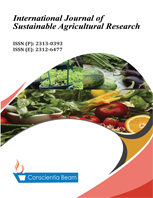Breeding for Weevil (Sitophilus Zeamais Motschulsky) Resistance in Maize (Zea mays L)
DOI:
https://doi.org/10.18488/journal.70.2020.74.255.266Abstract
A study was conducted with an overall objective of establishing the determinants of weevil resistance in maize. Field experiments were done at GART using a North Carolina Design II with three replications and also at Nanga research in Mazabuka. Laboratory experiments were conducted at Zambia Agriculture Research Institute (ZARI) Entomology laboratory and University of Zambia, Food Science Department where insect bioassay and the biochemical tests were done respectively. In the insect bioassay grain hardness, grain weight loss, median development period, F1 progeny emergence and the Dobie index of susceptibility indices were measured. Protein and the Phenolic content were determined under the biochemical tests among genotypes. They were highly significant differences in all the twenty seven genotypes evaluated. Results showed that Parental survival accounted for 78.5 % of the total variation, Phenolic content was strongly and positively correlated (r = 0.423***) with grain hardness providing a good measure of resistance accounting for the 10.9 % of the total variation. The study showed the possibility of breeding maize genotypes with an increased resistance and also susceptible lines had a decreasing Phenolic content but increasing Phenolic content resulted in increased resistance. It was therefore concluded that Phenolic content and parental survival can be used as an indirect selection criteria for weevil resistance.

